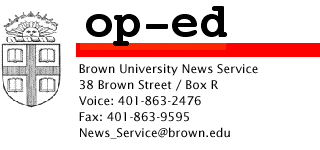Distributed October 2002
Copyright ©2002 by James G. Blight and janet M. Lang
Op-Ed Editor: Mark Nickel
About 895 Words
James G. Blight and janet M. Lang
On the 40th anniversary, George Bush hijacks the Cuban Missile Crisis
If the historical John F. Kennedy had done in October 1962 what the Bush administration says he did – asserting a doctrine of “preemptive defense” – the likely outcome would have been a nuclear holocaust. The historical evidence is now unambiguous.
During this 40th anniversary year of the Cuban missile crisis, the Bush administration has repeatedly claimed that it seeks to proceed with Iraq as John F. Kennedy did with the Soviet Union in October 1962.
Fifteen years of intensive research on the Cuban Missile Crisis in Russia, Cuba and the United States have shown us that the world came within a hair’s breadth of nuclear war in October 1962. If the United States had attacked the Soviet missile sites in Cuba and invaded the island as planned, here is what probably would have happened:
- The invasion force would have drawn fire from Soviet soldiers armed with tactical nuclear weapons – weapons U.S. officials did not know were present on the island.
- The United States would have responded with a nuclear attack on Cuba, killing more than 43,000 Soviet citizens clustered at the missile sites, along with hundreds of thousands of Cubans.
- The conflict would almost certainly have escalated. The Soviets would have seized West Berlin and attacked NATO missile sites in Turkey, drawing what President Kennedy called in his speech to the nation on October 22 “a full retaliatory strike on the Soviet Union.”
- If the nuclear exchanges had continued, the world as we know it would have been destroyed.
The resolution of the crisis occurred just hours before the U.S. invasion was to begin – or, as Soviet leader Nikita Khrushchev put it in a letter to President Kennedy during the crisis, just hours before “the mutual extermination would begin.” In the end, nobody attacked anybody. Nobody backed down. Everybody backed off. And just barely in time.
The Bush administration now says it has found in Kennedy’s response to missiles in Cuba an historical precedent for a new unilateralist doctrine of “preemptive defense.” But in shaping that 1962 confrontation into a precedent, the Bush camp has ignored how close the world came to nuclear oblivion, portraying the event as one in which toughness and military might prevailed.
Virtually all the senior members of the Bush administration’s national security team have been enlisted to recruit Kennedy’s ghost for the cause of a preemptive military attack on Iraq. Secretary of Defense Donald Rumsfeld made the case bluntly, in trademark Rumsfeld fashion, at a September 26 news conference, asking and answering his own question: “Now, what would you call the Cuban Missile Crisis action by President Kennedy ... preventing, if you will, the Soviet Union from placing nuclear missiles in Cuba? That was certainly self-defense, it was certainly anticipatory self-defense, it was certainly preventative ... he engaged in preemption.”
That assessment would not make a passing grade in our senior seminar at Brown University. The United States did not prevent missiles from being deployed in Cuba; it discovered them after the fact. There was no preemption, only a reaction that gave the Russians and Cubans some room to maneuver.
On October 8 in Cincinnati, President Bush himself invoked the Kennedy pedigree to bolster his argument for regime change: “As President Kennedy said in October of 1962, neither the United States nor the world community of nations can tolerate deliberate deception and offensive threats on the part of any nation, large or small.” But Kennedy was not arguing for regime change in his speech on October 22. He was addressing what an aide at the time characterized as “the lies, the disguise and the surprise” regarding missiles in Cuba that suddenly put tens of millions of Americans at risk. Those missiles made action necessary, but there were options that fell far short of a military strike.
Certainly, Saddam Hussein has offered lies, disguise and surprise, but he has been contained for more than a decade. Why the hurry about Iraq? Why the rush toward a military strike of the type that Kennedy ruled out as too dangerous as a first approach to removing the missiles from Cuba? Here Bush is cynical and misleading. “Some citizens wonder,” he said in Cincinnati, “after 11 years of living with this problem, why do we need to confront it now? And there’s a reason. We have experienced the horror of September 11th.”
As far as anyone knows, however, Iraq had nothing to do with the 9-1-1 attacks.
Enlisting the memory of John F. Kennedy is proving to be a tricky business because the Cuban Missile Crisis of October 1962 is not a true precedent for regime change in October 2002. The President Kennedy who is being invoked never existed – nor did the Cuban Missile Crisis as the Bush administration understands it. If the historical John F. Kennedy had done in October 1962 what the Bush administration says he did, the likely outcome would have been a nuclear holocaust. The historical evidence is now unambiguous. If Kennedy had undertaken a preemptive defense strategy, the United States and the world would have encountered catastrophe without precedent.
Kennedy worried constantly in October 1962 about the possibility that a preemptive attack against weapons of mass destruction in Cuba might stimulate Soviet forces to launch an attack against the United States in a “use ’em or lose ’em” scenario. Do Bush and his advisers also worry constantly about the likely consequences of a preemptive attack? If not, then they have missed an important lesson from 1962, and their attempted hijacking of the Cuban missile crisis could lead to an outcome even more tragic than the hijackings of 9.11.01.





